Soror Dolorosa is one of the greatest Goth bands that have emerged in the old continent in this century. The French three piece has recorded a very recommendable trilogy where a dark poetry is joined by sharp guitars and powerful bass lines. Now, we are eagerly waiting for their new work that, for you, will make us discover another side of the world of Soror Dolorosa. Their concert will be one of the highlights of the Batcave stage of the W-Fest that it’s taking place just next week.
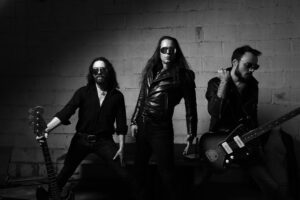 —In the past, you played drums in some French Black metal bands, such as Celestia, Fornication, Nuit Noire, and Peste Noire. How do you think that this experience has influenced the music you make with Soror Dolorosa?
—In the past, you played drums in some French Black metal bands, such as Celestia, Fornication, Nuit Noire, and Peste Noire. How do you think that this experience has influenced the music you make with Soror Dolorosa?
—Black metal was the first experience I had with music, and I think, like most things in life, the first things we get thought is a constant guideline for the forthcoming trajectory. Hervé, the bass player of Soror Dolorosa, first saw me play a Nuit Noire and Fornication concert in 1999. Then he came to me to share the first drink we had together. He was very enthusiast after the show and proposed me straight to play with him in a deathrock project. That was the first impulse of Soror Dolorosa‘s genesis, and this moment was the real creation of the band. At that time, I didn’t play anything else than Black metal and I just told him laughing: Alright man, I can try, but I’ll have to slow down a bit the tempo and not put double kick everywhere! That’s how I began to play drum in a Goth rock band, and I quickly discovered many other interesting aspects of playing drums in bands, like not making hysterical tempo all the time, but letting the music flow away in a more natural or danceable way. I also discovered the huge post-punk, Goth rock and new wave music that still influences me nowadays in making new songs of Soror Dolorosa. Black metal influenced all the aspects of my life, but it’s maybe on the stage, singing during live performance that this influence comes out in a more efficient way. There is a kind of violence and tension that is inherent to Black metal that Soror Dolorosa have during stage time. I don’t think other Goth projects have this visceral and dark violence within, so maybe that is a mark that my past left inside the project until nowadays.
—The band was formed in 2001 with you and Franck, Hervé and Christophe from Funeraell. Can you please tell us more about this? What kind of band was Funeraell? I could not find any info about it.
—Funeraell was a deathrock band very much influenced by the old Christian Death, Shadows Project and Corpus Delicti albums. I saw them play once in a Goth bar in Toulouse, circa 1999 and at the time I was not very much interested in Goth music which I didn’t knew that much. The band recorded a few demos that were not officially released or distributed, and I think even the members of Funeraell don’t really have today; we can maybe say that it is lost in the abyss of time and vicissitude of life. I remember that I had a 90 min tape running often in my old car, that Hervé gave me saying: Here you’ve got all Funeraell songs! Unfortunately, Toulouse was not a very safe city at that time and my car was stolen many times by losers who were searching for money or sunglasses to sell it afterwards for a few franks… that is how the Funeraell tape I owned ended somewhere into a pile of forgotten crap, or destroyed in a place that nobody knows.
—The name of the band, Soror Dolorosa comes from a novel by Flemish symbolist Georges Rodenbach. Why did you think that that name fit the music of the band?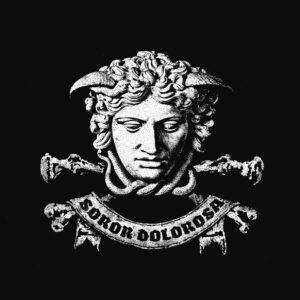
—The name was chosen by Hervé who read Bruges La Morte years ago and kept in mind the term of Soror Dolorosa. In the book, it describes the entity of the lost beloved one who disappears after death and stays forever in the lover’s mind. It also encapsulates the concept of eternal mourn facing the beauty of purest things in life after they’re gone. I guess people who already loved for real in life and lost, can easily understands what it means. This pain is the root of what we express in the lyrics. In the novel, the phantom of the dead fiancée also appears thought the reflections of the misty rivers of north’s Venezia and the hero also qualify the city as his painful sister, his Soror Dolorosa. This is a decadent literature milestone, and we have a deep fascination for this artistic style because it’s only related to the naked truth slightly wrapped into an aesthetic transparent cape.
—It was Hervé who introduced you into post-punk bands like Chameleons and Joy Division and I guess it was then when you decide to compose this kind of music. What did appeal you from those bands?
—I think what really blew me away when I heard Closer by Joy Division for the first time was the extreme coldness mixed with an infinite sensibility. Post-punk and New wave from the 80s in UK are the direct heirs of Symbolist artists and romantic poets for the 18th and 19th century. Since I was a child, I always been fascinated by those eras because I think that the art of this time: poetry, painting, sculpture and architecture, reached the highest points and became relevant shimmering mysteries. It brings me answers to my intimate questions, and every day refills my brain with a never stopping inspiration. I think the 80s scene is what our modern era brought as best, and I feel a kind of similar energy when I compose songs and play live with Soror Dolorosa. It is hard to describe, but it gives to me the impression that that time is not over when I do my music and it’s a huge stream of pleasure and force.
—You said that the only French band that has influenced you is Norma Loy. What do you find so special in this classic coldwave band?
—I think Norma Loy had something special in those songs and they were inspired by something very personal. They were pioneers of the genre in France and are quite unknown today. I love those bands that didn’t care about the music business but produced masterpieces made just for a few. Hervé gave me a tape at the beginning of Soror Dolorosa and told me: listen to “Tragic Venus” man, it’s magic!
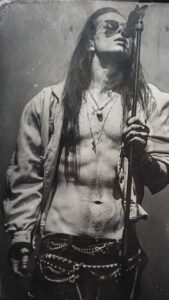 —How were the first years of the band with you still as a drummer? The band recorded a couple of demos, right? How was the music? More death rock?
—How were the first years of the band with you still as a drummer? The band recorded a couple of demos, right? How was the music? More death rock?
—At the beginning, the band was very dark deathrock, we appeared as androgynous and overlooked decadent souls. The music was merely atmospheric, sad and abrasive. We played a few shows and won a music contest that led us to our first studio experience. We recorded 5 songs in one day and the result was interesting. We played many shows afterward and met our talented guitarist of that time Emey, who composed and recorded the songs on Severance and Blind Scenes and also composed the No More Heroes tracks. Unfortunately, he left the band for personal reasons at the moment of the No More Heroes studio sessions. At that time, we also began to work with machines with Emey who was a skilled full composer and music producer.
—And then, in 2005, the band split. Why?
—At that time, we had another singer in the band and this guy was really hard to deal with, sometimes doing hysterical crisis for nothing and ruining the reputation of the band all around. We had a show in Paris for the summer’s solstice and at the end of the show, this person ended up into a garbage contaier, that was our after party; We had a fight in the streets and I personally put this person into a container because he tried to attack my girlfriend at the time. This is how we split up the first time in the history of the band. After almost one year of break, we rebuilt the band with Hervé, Emey and I on vocals, gathered around the beautiful melody of “Autumn Wounds”. In my eyes, this is the real beginning of Soror Dolorosa because it wasn’t built on the ruins of a previous band, and it naturally generated something totally new into an artistic expression.
—And why did you decide to reform only a couple of years later? It’s then when you decided to sing and Soror Dolorosa moved in a more goth rock direction, right?
—At the end of the first era, at the end of the shows I used to sing with the previous singer in front of the stage. The idea of taking the mic in SD came to me at that moment. After the break, I had the sensation that I could do something interesting singing into Soror Dolorosa, as I deeply had the sensation that I would have something to say. If we search for a more personal reason, I had a big sentimental change in my life at that moment and I think Soror is what helped me to deal with those difficulties.
—You have always said that the sound of the band is mostly based on the bass, played by the other founder member Hervé. How would you describe his sound?
—Hervé has been playing his Fender Precision for 30 years now. This instrument is like a third hand for him, a direct way to express his feelings and write melodies. Hervé often writes melodic basslines that are the fundament of the songs. Now this process is a bit over in the band and the new compositions are more a common effort or a personal research from our new talented guitarist and producer, Jean-Baptiste Marquet, but the slightly wooden driven sound of Hervé gave birth to most of the compositions we released so far and forged the sound of the band against winds and waves. I think we have a similar way to express ourselves with Hervé, we never took any music lessons and let just our instinct speak in creating music. I think that is why the band still exists today, after all those plains and deserts we passed by, it’s because we feel the music the same way, we vibrate with the same notes and like the yin & yang, we’re complementary in the encapsulation of the opposite entities who are necessary in the artistic creation. Light belongs to shadows like cold swirls to heat and the moon reaches transcendental beauty in bathing into the rays of sun. Soror Dolorosa is a dual entity who resonates by the same rules.
—Finally, the first EP, entitled Severance was released in 2009. Did you compose the songs just for the release of they were part of the ones you already had?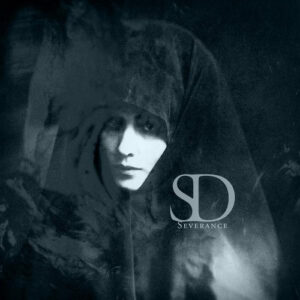
—At the beginning, we didn’t plan to release anything, and we were just composing songs and exploring what we had in mind. Luckily for us, we had a close friend, Artess, mastermind of the bands Lysart and Le Mauvais oeil. He had a good home studio and proposed us to record those songs. We made the studio session and then took the tracks at home to make our mix, engineered by Emey, our guitarist. After six months working on the songs, we ended up with Severance and we had the deal with Todestrieb records in the UK who proposed to release it. That was the real beginning of our official story as a band in the underground scene.
—As the lyricist, who much of your personal experience did you put in Blind Scenes, your first album?
—Blind Scenes is a very moody and nostalgic album. It is also kind of traditional and minimalistic in the arrangements. I consider this album the most personal regarding the lyrics, especially on songs like “Low End”. The lyrics of this album relate the deep consciousness of the moment when you touch the bottom, which shows you what need to be changed to make a possible evolution, to reach another state of mind. I don’t want to speak clearly about my personal experiences neither to expose my private life thought the lyrics, so I use images as a way to communicate those feelings and make things understandable in listening each word. There is not a constant gimmick in my way of singing, each song had its own theme, and my voice follows naturally those lines. Sometimes I whisper, sometimes I shout and most of the time I want to say things that cannot be told only in writing words but expressed with honesty and passion. Blind Scenes was my first experience in recoding my voice with a producer and it’s kind of difficult when you’re into a very intense psychologic process. At that moment it’s really a good thing to have someone that understands and appreciates you better than yourself for the challenge.
—You said that the band shaped when all of you composed “Autumn Wounds” in 2007. What does this song still mean for the band?
—”Autumn Wounds” lyrics was written years before by Hervé, as a poem formerly written in French. I perfectly remember when Emey and Hervé played quietly at night those arpeggios and the lyrics were instantly translated in my head as I was reading them written on a paper and the notes came naturally. Hervé always wrote poems, most of the time in French and he had this habit to write them to me on papers late at night when we were wasted somewhere in a bar or in a middle of a deserted ruin. “Autumn wounds” is a symbol for us a kind of perfect illustration of what is our creative process. It’s an instinctive connection between us, impossible to describe with words, only the music is suitable to create a shape to this psychic link.
—About your second album, No more Heroes, you said that you saw it as a transition album. 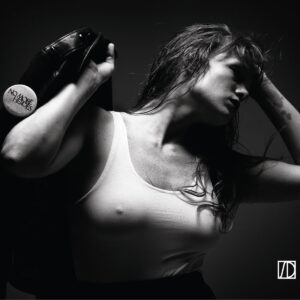 What did you mean with that?
What did you mean with that?
—No More Heroes is the album that make us came from anonymous darkness to the lights of the stage. This is an album to shake the ground and take the night with both hands. It’s not nostalgic anymore, it speaks about the vibration of life and describe the preciousness of the present moment. At that moment, we welcomed firstly Nicolas Mons (Lysart, Le Mauvais Oeil) and then David-Alexandre Parquier (Luminance) as guitar players. We were 5 onstage, that gave us much more power and enlightened our live energy. We made a lot of concerts all over Europe and that was a very nice period for the band, full of great experiences and crazy nights. I think when you do an album, the album gives you back what you put inside, nothing more, nothing less. You get back from the audience what you put inside of your music and that is magic with the stage. No More Heroes is the album that made us learn this phenomenal power that only music have.
—Quoting you, you said that it was an album about looking in the future. An album to live the present. Do you think that Goth music sometimes is stuck in the past?
—Dark music in the 80s had a golden era. If Goth music stays a bit stuck in the past, it’s because nostalgia is a part of this music in itself. Melancholy is what you feel when you think about beauty lost in time and the intensity that can never come back. That’s why there are always tracks released 40 years ago sounding on Goth dancefloors and people still dancing to them like crazy. Goth music is very emotional, and the universe of feelings are still linked to the past, to things you experienced in life and still have a strong effect on your soul. Goth music is also stuck on quality because Goth people really know what they like, and they are a very connected and exigent audience. Most of the Goths are vinyl collectors and listen to this kind of music since their teenage years. If you’re true to life and true to yourself, you never deny it and still want to keep this flame alive until the end, and this is absolutely beautiful in Goth music; I think it’s kind of similar with metal music, but with dark wave it’s maybe more ethereal and poetic.
—How do you think that your time in Georgia influenced the composition of your next work, Apollo?
—During all the process of Apollo I used to travel often to Georgia and that was a moment when I discovered a lot of things regarding life in general. I began to feel a different kind of power inside of my head and began to learn how to play piano, because there was a beautiful piano in the flat where I was staying and the night in Tbilisi is truly magic. It’s very different from western Europe, things are rawer, they are truer in a certain way. Georgia is an antic civilisation: the cradle of Caucasian culture and Apollo is a travel thought space and time starting from a blurred antic dream to the sharp transcendence of life. This album is the most ambitious story to tell we made so far and incorporates a lot of new elements like pads, keyboards, piano and drum machines. There is a lot of layers and a more complex architecture, it’s more a dreamscape than a basic Goth rock album.
—In Apollo you were inspired by John Keats’ Endymion and “Locksley Hall” lyrics were an extract from an Alfred Tennyson poem. You have also named symbolism as an influence. Do you like to give a literary touch to your lyrics? Don’t you think that lyrics, in general, are getting simpler nowadays?
—I’m fascinated and very interested in English romantic literature. It brings me a lot of feelings and inspiration. I don’t care about what is made nowadays regarding the lyrics, I just do what I feel and need to spread my vision in writing songs. I’m sure a few people will take care about what is said in the songs and will understand the sense of the words. Today, words are in disgrace because of the supremacy of fast images but I think right words are still very important in modern music. They give a certain weight and a special fragrance to the notes, like a perfume can do on the skin of the one who wears it. For the next album, I went thought William Blake magnificent verve, so the love story between Soror Dolorosa and English literature is till on a bright flame!
—Why did it take the band four years to finish the album? The band even stopped playing live, right?
—During the recording process of Apollo, the band splitted into two teams that were not totally agree of what would be the final result of the album. This was a very complicated situation for a band that was working in the studio, so it took years to find out a solution and finalise a record with a sense of harmony. When the album was released in 2017, we made two final shows and decided to split because we were not able anymore to make music altogether for many different reasons, but mainly because we didn’t have the same vision anymore of how Soror Dolorosa should sound.
—Why did you choose Apollo as the name of the album? You said that the album was the termination of a trilogy, a spiritual pathway from the dark to the light. Is Apollo a metaphor of that light reached at the end of the path?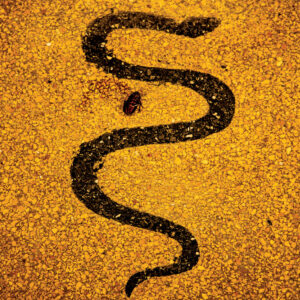
—Historically, Apollo is the god of Art and the divinity that represents the sun, the transcendental source of light that makes anything possible on our galaxy and by definition, the main element in the apparition of life. Yes, I can say that Apollo is this metaphor, and it’s also a word which is monolithic and refers to the idea of an antic shrine, a marble statue or etheric light beams through the haze of life. Apollo as a god is often represented with a lyre playing music, spreading light on the world. I love this vision, and I wanted to share the light I felt in travelling and learning so many things on myself. I think the song “A meeting” illustrates very well this vision. Just play this song and I guess you’ll get the essence of the album topic and what kind of light Apollo represents in the Soror Dolorosa’s universe.
—The band has added new influences like post-rock and shoegaze. Are these influences going to continue in your music? Did you add any new one?
—Yes, those influences are growing in the next songs, but I think there is one which is predominant in the next opus with its smashing drum machines melted with hypnotic and ethereal keyboard lines. The next album will be the most powerful record we made so far, and I will not be too much prompt saying it because it’s James Kent from Perturbator who is actually doing the mix and postproduction of the album!
—You have also not hidden your love for pop music and said that it was an inspiration. Do you think that goth people should be more open-minded regarding pop?
—I think pop music can be really interesting even for dark souls, because a good pop song is before all a good written song and that is decisive in music. We don’t speak about commercial crap, but very good electro pop like Depeche Mode or A-ha or guitar-based music like David Bowie or Slowdive. Well, the space between pop and Goth music is not that big and I think it’s particularly interesting when the frontier is blurred, and the style of musical projects are not made of clichés but are more into a spiritual DNA.
—After the recording of Apollo, Nicolas, David-Alexandre and Franck left. Was it difficult to continue without them?
—After Apollo came out, we reached the end of the road we had to make altogether and we stood with Hervé, wandering what shape Soror Dolorosa would take afterward. Quickly new demos came from our mental connection, and we started a new process in making songs, like we always did. I prefer not to speak about the band’s intimacy and today I don’t have any regrets with Soror Dolorosa, I only have projects!
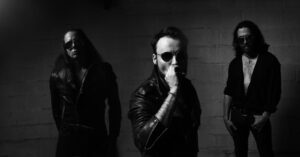 —Are you following Franck’s new project Human?
—Are you following Franck’s new project Human?
—Not at all, I prefer to not carry on with this and I wish him success in what will come. Sometimes it’s better to make clear cut.
—In an interview you said that there was no real dark scene in France. Do you still think the same?
—The French dark scene is very fragile, there are only a few bands, but I don’t consider it as a real scene, specifically the Goth one. There is a good example for this: there is not more Goth festivals in France, that means that maybe I’m not totally wrong in what I say. I think French bands are great because there are not two bands sounding the same, and it’s what I also like in the French Black Metal scene, I think it’s a kind of unique and very precious thing regarding French dark scene, bands had all their own identity.
—You have played with another band that we like a lot, Varsovie. Arnault also comes from the French Black Metal scene, and you even did the artwork for their album État Civil because you area also a photographer. How’s your relationship with that amazing three-piece?
—I love Varsovie, it’s a killer post-punk band! They are friends of ours and we often share the stage, always with a big pleasure. I think they get better and better each time I see them onstage. They play with their heart and soul and that is the main thing when you do post-punk. We also had the same experience going to Drudenhaus Studio to record our albums, so we finally shared a lot of things, and we appreciate ourselves as good mates and have perfect moments when we meet somewhere in a backstage or at the counter of a bar!
—As we said in the previous question, you are also a photographer. How would you define your personal artistic world?
—I’m obsessed with beauty, the one which is haunting and mysterious. I think it’s a simple way to clarify my work as a photographer. I love to capture the unspeakable truth and reveal the purest aspect of souls in my pictures. I try to do pictures that don’t really age because they show a part of pure transparency with the real world. I simply take a good care of what I show. For me, it’s the best way to open ageless windows into the world of dreams.
—And how would you describe the visual element of the band?
—Each album has his own graphical code, there is not only one aesthetic for Soror Dolorosa. I love to explore my obsession of a special moment and I cannot plan what will be the future images to be connected with the songs; I don’t want to enclose the band into something systematic, life is not like that, so why do music have to be?
—When are we going to finally have your fourth album? It was planned for 2022, right?
—Absolutely, we’re a bit late on the planning but the recent events of the past 3 years made their effect in bad and good. We are terribly exited at the idea of releasing the next opus, maybe more than in 2022, so I think it’s finally a good thing to wait for good reasons. We’re not beginners anymore and we want this record to be perfect, sometimes time is on your side to reach this intimate idea of a perfectible work of art, and there is a moment that you feel it’s done. We’re actually getting this nice taste on our tongue.
—You already played some of these new songs live, how was the reaction of the public?
—It’s never easy to play songs that nobody heard before, but the reaction was really positive I must say. People were really enthusiast, and we also had some live concert proposition just after the concert, which is a good sign.
—What can we expect of your concert at W-Fest?
—We always loved the moments we spent in Belgium; I think Belgians are more rock and roll and easy going than French people! The program of this edition is absolutely amazing and we’re more than honoured to play alongside so many bands that influenced us for years. We gonna play in summer’s daylight and that is not in our habitude as we are night birds, but I must say, for once our big sunglasses will be very useful if a glowing sun will give us the pleasure to shine bright and make this event a great moment for everybody! And even if the rain falls down, it’s not a problem, we gonna make like Boytronic did last year in Ostend, play with all our heart and soul to make this event engraved forever in memories!



